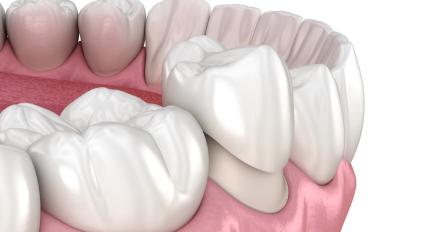
Dental Crowns are tooth-shaped caps which are placed on the tooth to restore the shape, size, and appearance of the tooth. It also enhances the strength of the tooth. If the major part of the tooth is missing, then the crown is the best solution for it. By placing the crown, a tooth can function normally again.
A Teeth cap gives your tooth strength, shape, size and helps to improve the appearance of your tooth. If your dentist has advised you to get a crown and you are delaying the process then there are chances that you can damage your tooth to the extent that extraction is the last resort. Moreover, not getting a dental crown can wear down other adjacent teeth causing damage.
When is Dental Crown needed?
Dental crowns are used as tooth caps on missing or fractured teeth to protect the life of your teeth. They are needed to:
- Protect or restore a tooth from fracturing due to accident or trauma
- Replace a tooth that is too large for a filling
- Get a cap over the Implant placed
- Restore the tooth on which RCT was performed
- Cover discolored, misshapen, or badly formed tooth
- Require a bridge in that case crowns are a must
What are various types of Dental Crowns?
Dental Crowns can be made in a variety come in various materials such as:
Metal Crowns
If someone is looking for a long-term and durable solution then metal crowns are to the rescue. The gold crowns in these are the most used and bond well with the tooth. These can even withstand hard chewing forces and biting. Being stronger they last longer and do not wear down easily. The only drawback is that they are visible from a distance hence, suitable only for molars. Learn more about Metal Crowns Cost.
Porcelain-fused-to-metal
If you have aesthetic concerns and also wish to have metal crowns inserted then these are the best option available. The inside of the teeth is made up of metal and the outer portion of the crown is made of porcelain, as a result, it has the dual advantage – metal which provides strength, and porcelain which matches the color of the teeth making it look like natural teeth. They look the most like natural teeth. Learn more about PFM Crowns Cost.
Ceramic Crown
They are also known as resin-bonded bridges. They use metal wings instead of crowns to secure the bridge in place. The wings are bonded to the back of your neighboring teeth.
Given their design, they aren’t strong enough to withstand the chewing forces of back teeth, hence used to replace front teeth. Learn more about Ceramic Crowns Cost.
DO’S AND DON’TS WITH DENTAL CROWNS
DO’S
- Since the natural teeth are still beneath the crown and are vulnerable to decay, it is important to maintain good oral hygiene therefore brushing, rinsing and flossing should be followed regularly.
- If you clench your teeth, then it is advised to use a mouthguard to protect your crown and this also does not allow your teeth to wear down.
- Get crowns only from a dental expert who is trained in placing dental implants. Poor placement of crowns can reduce the longevity of crowns.
- Do visit your dentist every 6 months to ensure that your oral health is in the best care.
DON’TS
- Do not use your teeth as tools as this will put pressure and will damage the crown
- Do not bite your nails and chew pencils
- Do not chew ice or candy which is hard
- Do not eat sticky food
- Do not consume too hot or too cold food as this might cause sensitivity
MYTHS ABOUT DENTAL CROWNS
Dental Crowns carry a lot of myths with them a few of them are:
Myth: Dental Crowns do not look natural
Fact: There is a misconception that dental crowns do not match your teeth hence giving the impression of an artificial tooth. However, with changes in technology crowns come in various materials which look exactly like your natural teeth. Even metal crowns are a good and viable option because they are used as molars and are never seen.
Myth: Crowns last forever
Fact: Though the crowns are now stronger and have longevity, they cannot last a lifetime. It also depends on how well they are taken care of. To ensure they last longer visit your dentist every 6 months, your dentist will monitor your crown and will replace it timely.
Myth: Food and Beverage stains the crown
Fact: The biggest myth that people carry. They believe that food and beverages can stain their teeth with time but in reality, the crowns are made of porcelain and ceramic which do not stain easily.
Myth: Only used for restorative dentistry
Fact: People believe that one gets a crown only if they have a fractured tooth, have undergone root canal treatment, or have broken or chipped a tooth. But the truth is they are used in cosmetic dentistry as a way to enhance appearance and to have a whiter and beautiful smile.
Myth: Dental Crowns do not break or chip
Fact: Though ceramic and porcelain are harder substances yet if you bite on something extremely hard, or face an accident or trauma then your crown may break.
Myth: You cannot get cavity with crowns
Fact: Because the crown covers your tooth, therefore, they become vulnerable to decay. Though crowns, as they are artificial, have no chance of decay yet the part below them can decay. It is, therefore, required to keep your teeth and the area around clean to prevent a cavity.
Comparison between Crowns and Bridges
| Aspect |
Dental Crowns
|
Dental Bridges
|
| Definition |
Prosthetic devices that cover damaged or decayed teeth |
Prosthetic devices that fill gaps left by one or more missing teeth |
| Purpose |
Protect and restore individual teeth |
Replace missing teeth |
| Structure |
Covers entire visible portion of a single tooth |
Consists of one or more artificial teeth supported by crowns on adjacent teeth |
| When Recommended |
- To protect weak teeth
- After root canal treatment
- For cosmetic enhancement
- To anchor dental bridges
|
- Replacing missing teeth
- Preventing shifting of surrounding teeth
- Restoring chewing and speaking ability
- Preserving facial structure
|
| Materials Used |
Porcelain, ceramic, metal alloy, or combination |
Ceramic, porcelain, metal alloy, or combination |
| Procedure |
Fits over an existing tooth |
Spans gap between teeth, anchored to adjacent teeth |
| Preservation of Natural Teeth |
Preserves and strengthens existing tooth |
Requires modification of adjacent healthy teeth for support |
| Number of Teeth Involved |
Usually involves just one tooth |
Involves at least three teeth (two anchors and one or more pontics) |
| Longevity |
Can last 5-15 years with proper care |
Can last 10-15 years with proper care |
| Maintenance |
Regular brushing, flossing, and dental check-ups |
Regular brushing, flossing, and special care to clean under the bridge |
How to choose between Crowns and Bridges
Deciding between a dental bridge and a dental crown is an important decision that should only be taken post consideration of various factors.
| Factor |
Crown
|
Bridge
|
| Oral Health Status |
Weakened, cracked, or decayed teeth |
One or more missing teeth |
| Number of missing or damaged teeth |
No missing teeth, but weakened or damaged teeth |
Several teeth missing in a row |
| Budget considerations |
More affordable, as only one tooth requires restoration |
Costlier than Crown, as creation of multiple crowns and artificial teeth required |
| Aesthetic preferences |
Custom-made to match your natural teeth color, shape, and size |
Fills in the gaps caused by missing teeth, result in beautiful and complete teeth |
Both crowns and bridges are aimed at providing you a natural appearance, giving you a smile blended in with confidence. But the final decision between choosing the two depends upon the factors listed above along with a thorough clinical examination and consultation. Your dentist will assess your specific oral health needs and recommend the most appropriate treatment option to restore your smile and oral function effectively.
How much do I have to pay for dental crowns?
The price of dental crowns depends on the type chosen by the patient. For example, an all-ceramic dental cap costs more than a metal crown. However, to make it an even more affordable option patients can also choose to pay the price in EMIs at Clove Dental clinics.
Dental Crowns cost at Clove Dental
Our general-purpose PFM dental crown cost begins at Rs. 4,690. The PFM teeth cap price for tooth implant purposes starts at Rs. 8,190. For those who prefer Metal-free crowns, our Zirconia options start at Rs. 9,490, and those tailored for Dental implants are Rs. 10,800. Depending on the type of dental cap you choose, our Dentists, Endodontists, and Prosthodontists aim to restore both the look and function of your teeth.
Book an Appointment
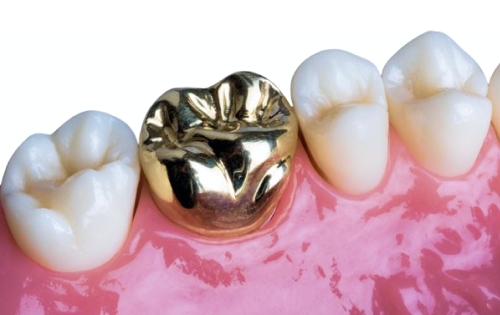
Metal Crown
s
Starting at Rs. 3,490
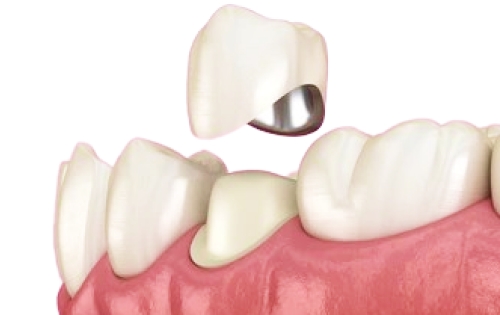
PFM Crowns (General)
s
Starting at Rs. 4,690
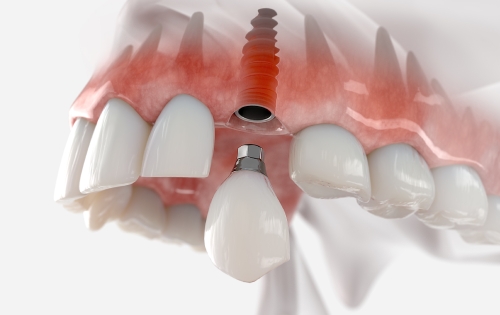
PFM Crowns (For Implant Prosthesis)
Starting at Rs. 8,190
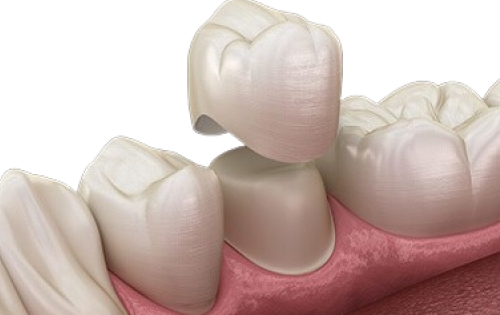
Crowns – Zirconia (Metal Free)
Starting at Rs. 9,490
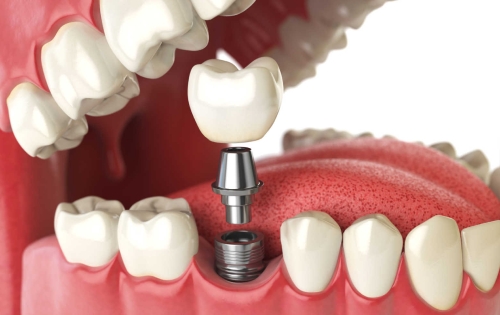
Crowns – Zirconia (Implant Prosthesis)
Starting at Rs. 10,800
HOW LONG CAN YOU EXPECT A DENTAL CROWN TO LAST?
The average lifespan of a crown or tooth cap varies depending upon the material being used, along with dental hygiene habits and other lifestyle factors.
One of the most important factors in the longevity of a crown is a good oral hygiene regimen. This includes:
- Brushing your teeth 2 to 3 times a day
- Flossing at least once a day
- Getting dental cleanings every 6 months
s
The other factors that affect the longevity of a crown include:
- The type of crown – includes the quality of the crown, how well it’s fabricated and the material used for the same
- Health of the affected tooth – If the tooth was relatively healthier with longer roots and healthier surrounding gum and bone levels, both the crown and the tooth will likely have a better prognosis.
- Using your teeth as tools – When teeth are used to uncork bottles, tear threads, or chew on ice and pencils, it tends to negatively impact the longevity of a crown.
- Tooth grinding – Clenching and grinding your teeth, especially when done at night, wears down a crown’s surface and jeopardizes its stability. This seems to be more of a concern when the crown is made of a ceramic material.
So to sum it up, depending upon the type of dental material used, the average lifespan of a crown is around 10-15 years. However, with proper care, good dental hygiene habits, and regular dental checkups, the crown may last for decades.
Google Reviews
Got a my treatment done at Clove Tagore Garden. Dr Savneet was excellent in her work. Thank you dr and DA Vishal.
Got RCT and crown at Clove Dental Shela. The doctors, especially Dr. Hemali Vora and Dr. Shubhangi, were very efficient and caring. Great experience and highly recommended.
At Clove Dwarka Mor, I got RCT, laser, and crown treatments. Dr. Sonu, Dr. Sagarika, and Dr. Bharat explained everything well and treated me with care. Very clean and professional clinic.
FREQUENTLY ASKED QUESTIONS
Q.1. What Is The Cost Of Dental Crowns?
Dental Crowns may be more expensive than fillings, but they have the advantage of actually lasting longer as well. At Clove Dental, we ensure that our patients always get the best quality and value for their money. Visit your nearest Clove Dental Clinic for more information.
Q.2. How Long Does A Dental Crown Last?
Depending on several factors that include the case specifics, material, and compliance with oral hygiene routines, dental crowns may last anywhere between 5 to 15 years. We advise our patients to maintain their oral hygiene after the implantation of dental crowns.
Q.3. Do Dental Crowns Hurt?
Before the procedure, dentists administer a local anesthetic. Therefore getting dental crowns may not hurt. However, once the anesthetic wears off, feeling soreness and sensitivity in the gums is usual, and it usually goes away in a few days.
Q.4. Do One Need a Dental Crown After RCT?
Root Canal Treatment means that the pulp inside the tooth will be cleared out. Therefore to provide strength after filling up the cavity, teeth cap are usually used. Adding a crown to the tooth after RCT is a must.
Q.5. What problems could develop with dental crowns?
Some of the common problems that develop are:
- Discomfort or sensitivity
- Chipped crown
- Loose crown
- Crown falls off
- Allergic reactions
- Dark line on the crowned tooth next to the gum line
Q.6. Do I need to undergo root canal treatment for placement of the crown?
There may not be a need for root canal treatment when crown placement is being done for the following reasons:
- Improving the look of a discolored tooth
- Chipped teeth, that do not extend to the pulp chamber
- When used as anchors for dental bridges
Q.7. What are alternatives to dental crowns?
3 most popular alternatives to dental crowns are:
- Onlays
- Dental veneers
- Dental Filling
Q.8. What should be done if a dental crown falls off?
When a crown falls off into your mouth, immediately remove it, as there is a risk of swallowing, or injuring surrounding tissues by its damaged or rough edges, if present. Next, visit your dentist, if there is no damage to the crown, there is a good chance they’ll clean it up and fit it back into your mouth, or else will start prepping for a new one. Waiting for too long isn’t recommended as there is a chance that bacteria might penetrate the underlying tooth and cause infection.
Q.9. What are the Pros and Cons of Dental Crowns?
Pros:
- Restore cracked or damaged teeth
- Correct discoloration or alignment
- Replace worn-out fillings before they break
- Restore dental implants
- Prevent tooth breakage after a root canal
Cons:
- There might be a need for repair or replacement
- Requires minor tooth reduction
- Increased sensitivity to hot or cold food and beverages for a few weeks
Q.10. What is the best Dental Crown Material?
Zirconia is currently the top choice for crown material. It’s a cutting-edge metal that manages to provide you with a balance of strength and beauty.
Q.11. Will my Crown Look Natural?
Having a natural-looking crown is an attainable goal. When done correctly, dental crowns will yield a realistic appearance and blend in with the rest of your teeth.
Q.12. How many appointments does it take?
Two appointments are required, the first appointment consists of impression taking and in the second the crown is checked for fitting and placed.
Q.13. Can a crowned tooth get a cavity in the future?
Crowns are excellent at protecting teeth from further damage or decay, but they can harbor bacteria if not properly cared for.
Q.14. What preparation is needed for a dental crown?
Preparation for a dental crown typically involves:
- Dental Exam and X-rays
- Reshaping the tooth to accommodate the crown
- Taking impressions for custom crown creation
- Placing a temporary crown
- Color matching for natural-looking crowns
- Thorough cleaning of the prepared tooth
- Possible root canal if there’s significant decay
- Discussion of aftercare instructions
The exact process may vary based on your specific needs and the type of crown. Your dentist will guide you through the necessary steps for your situation.
 Medically Reviewed
Medically Reviewed
Last Reviewed by Clove Clinical Team on Dec 03, 2024 | Written by Dr. Shreya Singh
Learn More About Dental Crown (Tooth Cap)
Also, learn more about all available dental specialties and treatments at Clove Dental here.
People who viewed this page also visited




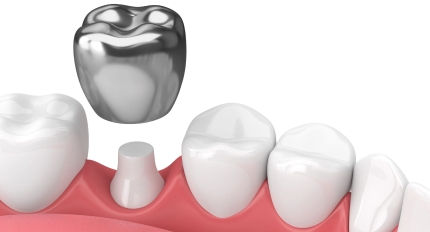
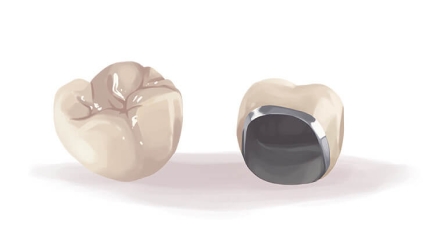
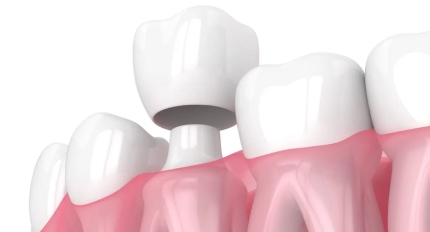







 Call us: 9393553232
Call us: 9393553232